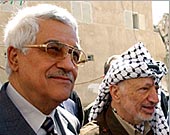A road map to where?
It was supposed to represent a milestone in the history of Palestine: the appointment of a first ever prime minister, a new internationally-endorsed peace blueprint and promises of a better future.
Yet somehow many Palestinians were not all that hopeful the coming days were any less bitter.
 |
|
Palestinians are sceptical |
“A roadmap!? A roadmap to where?” asks the young taxi driver hiding behind a pair of dark shades, as we drive in the midday heat from the 3-kilometre-long Israeli roadblock at Surda, between Ramallah and Birzeit.
“Where will this roadmap lead us? To Peace?” he asks.
“There can be no peace when the new people appointed are in fact hiding their American minds behind Arab faces.” He adds, referring to the new cabinet rubber-stamped of late by the Palestinian Legislative Council (PLC), with Mahmoud Abbas, approved as the first prime minister ever in the long history of Palestinian struggle for independence.
Although Abbas, better known by his nom de guerre Abu Mazen, has been welcomed by Washington and cautiously received by its ally Israel as a key reformer, many Palestinians have made it clear that they see him as a puppet leader, who may be orchestrating for yet another doomed Oslo Peace Accords.
“What will Abu Mazen do that the rest have not? He will lead us into another Oslo…three or four years of happiness and then back to this miserable life,” says Abu Mahmoud, a huckster who makes his living off selling ornaments.
“Besides, how can they call it a roadmap when there are no roads left to take?” He adds sharply.
Somehow, I think twice before I realize he means roads to peace.
My initial thoughts had eluded me into fixating on the tattered roads of Ramallah.
Indeed, there are hardly any roads intact in this central West Bank city, which has been serving as the temporary Palestinian capital since the Palestinian Authority arrived here in 1995.
Following last year’s large-scale Israeli invasion and the subsequent re-occupation of the entire West Bank, par the oasis city of Jericho, roads were systematically destroyed, lamp posts uprooted, buildings peppered with tank shelling and gunfire and government offices looted.
For this father of eight, like many others, the “roadmap” is no different than the several other peace initiatives made and accordingly shelved throughout the 31-year-old Palestinian Intifada for independence.
 |
|
Behind bars: Palestinians fear |
The Tenet Understandings, the Mitchell Report, the Saudi-sponsored Arab Initiative endorsed by the Beirut Summit are but a few of the several peace initiatives abandoned.
Of course not everyone shares my Abu Mahmoud’s and my taxi driver’s pessimism.
“Abu Mazen is a reformer and he can definitely put an end to suicide attacks, which are ruining our image as people with a legitimate cause and legitimate rights,” says a young woman working for a charity organization, who preferred to remain anonymous.
“At least stopping suicide bombings will show the world that Israel is persisting in murdering our people not in the sake of combating “terrorism” but for the sake of abolishing an entire nation,” she adds.
But for many Palestinians whose sons, daughters, fathers or mothers were languishing in Israeli prisons and detention camps, the appointment of Abu Mazen is not something they regard as a landmark event in Palestinian history.
“What will he [Abu Mazen] be able to change?” asks Rose Yacoub, whose brother Salam has been held without charge in Israeli administrative detention for eight months.
Yacoub, a Christian from a village just west of Ramallah, also fears for her other brother, Israr, who is still serving a five-year sentence in the Megiddo prison in northern Israel.
“Israel will go out of its way to ensure that this roadmap is shelved just like all the other agreements were in the past.” She emphasizes.
Like others whose family members are incarcerated, Yacoub is not optimistic Abu Mazen’s very ambitious plans stipulated in his speech before the PLC will be fruitful.
“Let’s assume the Israelis show a gesture of goodwill for Abu Mazen’s stand on demilitarising the Intifada and release all those in administrative detention. What will happen to Israr, who is serving a five-year sentence?” she asks.
Just then her father cuts in and says that he is not as pessimistic.
Believing in divine intervention, her father in his 70s, says, “God willing, Israr and Salam will be released. I pray for the best and upon their release I will make sure they are immediately married,” he says with a hopeful smile on his face.
It seems that many here associate the “roadmap” directly with Abu Mazen personally.
Washington itself has linked the unveiling of the much-awaited “roadmap” to peace with Abu Mazen himself. The launching of the peace blueprint, the US asserted, was conditional upon Abu Mazen’s appointment and the approval of the cabinet he had put together.
Immediately after Abu Mazen and his cabinet ministers took their oaths of office before Palestinian President Yasser Arafat at his battered Ramallah headquarters, the long-overdue roadmap was released and with it the promises of the establishment of a Palestinian state by 2005.
The “roadmap” put together by the diplomatic “Quartet” comprising the US, EU, UN and Russia, envisions a state of Palestine within three years, while guaranteeing Israel the security peace, and Arab recognition it seeks.
Abu Mazen’s appointment comes following a breakthrough in a deadlock between the veteran Palestinian President and the Secretary-General of the PLO’s Executive Committee.
It is not clear whether the “roadmap” will be successful but many analysts say the blueprint’s primary success is contingent upon the US pressuring Israel, which has expressed several reservations at the new peace move, to carry out its obligations.
Dr. Ali Jarbawi, a professor of political science at the liberal West Bank University of Birzeit suggests that the road for peace will be bumpy and it may not lead the Palestinians anywhere should the US not pressure the Jewish state to adhere to its obligations – which is the most likely scenario.
“I don’t think that the roadmap will take us somewhere far and the reasons are clear: the current Israeli government does not approve of this roadmap and the American administration is not serious in implementing it,” he says.
“While the US administration adhered to publishing the roadmap as is, it will not however adhere to implementing it as such and there is a wide gulf between the two phases.
“What we will witness then is a prolonged phase of dual exchanges between the US and Israel, wherein the US will give in and agree to make crucial Israeli changes on the peace blueprint.”
The likely scenario, he adds, is that the US administration will pressure the Palestinians into implementing the “roadmap” with the requested Israeli changes, and then blame the Palestinians for its failure.
The professor also believes the Palestinians are caught in “damned if you do and damned if you don’t” situation: if they implement the “roadmap” they will be branded as “traitors” by their own people for working on achieving Israeli goals and if they do not they will be blamed for the failure of another peace initiative.
The Palestinians have few options and they hinge on how resilient Abu Mazen’s government can be in the face of pressures pushing for a head start with the “security issue” Israel is calling for.
Abu Mazen has already faced his first test: a human bombing by an offshoot of his Fatah faction on the coastal Israeli city of Tel Aviv and a deadly Israeli raid on a residential neighbourhood, east of Gaza, which left 13 Palestinians, including a two-year-old toddler and two teenagers dead.
But will Israel with its right-wing government adhere to a “roadmap” to which it has expressed several reservations. And will the incumbent US administration face losing out with its Jewish electorate on upcoming presidential elections by pressing for a peace blueprint that will pave the way for a Palestinian state?
Dr. Jarbawi said: “If we don’t see positive signs showing a change in the status quo in two months I think it will probably be an opportunity that has been lost.”